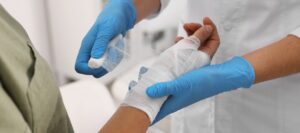All over the country, hot humid conditions prevail this time of year, and as you know Florida is no exception. Sometimes the conditions can too much for the body and cause heat stroke (aka sunstroke or heat stress). Heat stroke is a serious injury which causes the body’s ability to control temperature to fail, resulting in dangerous effects. Heat stroke’s primary causes are dehydration and long-term exposure to high temperatures, but there are other contributing factors. Today, let’s gain a better understanding of the causes, signs, and prevention of heat stroke.
Causes of Heat Stroke
You already know that heat and humidity are the obvious causes, but there are other contributing factors which increase the risk including:
- Not Drinking Enough Water causes dehydration and heat stroke.
- Children, from babies to four-year-olds, and adults over the age of 65 are more susceptible to heat stroke.
- Those with diabetes, heart disease, kidney disease, lung disease, and high blood pressure are more vulnerable to sunstroke.
- Individuals who are underweight as well as those who are overweight are at a higher risk of heat stroke.
- Taking certain medications can also increase the risk of sunstroke, including antidepressants, antihistamines, diuretics, antipsychotics, tranquilizers, stimulants, heart and blood pressure medications, seizure medications, and sedatives.
The Signs of Heat Stroke
Heat stroke happens when excessive humidity and heat cause your body temperature to rise above 105°F. Common signs and symptoms of heat stroke include overheated skin, dizziness and fainting, nausea and vomiting, a throbbing headache, fast shallow breathing, rapid heartbeat, muscle cramping, confusion, seizures, and unconsciousness. Should you or anyone around you exhibit these symptoms, call for help immediately.
Avoiding Heat Stroke
You might think, well avoiding heat stroke is as simple as staying inside with the air conditioner cranked up. And of course, that will work, but you’ll miss all of the fun activities that go along with hot, humid temperatures! So, to avoid heat stroke and enjoy the great outdoors, take these steps to stay safe and healthy in the heat.
- Wear a hat, wide-brimmed is preferable and offers the most coverage and protection.
- Select your clothing wisely, choosing lighter colors and light weight, breathable fabrics.
- Use sunscreen with an SPF 30 or higher.
- Drink a minimum of eight glasses of water or juice every day to stay hydrated. More if you are active and outside for long periods of time. Always drink an abundance of hydrating liquids (like electrolyte sports drinks) before, during ,and after sports or other fun outdoor activities in high humidity and heat conditions.
- In times of excessive heat, consider rescheduling sports or outdoor activities to an indoor location or a cooler time of day.
- If you are outside a lot and on medication that increases your chance of sunstroke, talk to your doctor about other alternatives.
And most importantly, if you notice any signs of heat stroke, seek medical attention immediately. Medical professionals will provide the care you need to get back to your fun in the sun as soon as possible!





